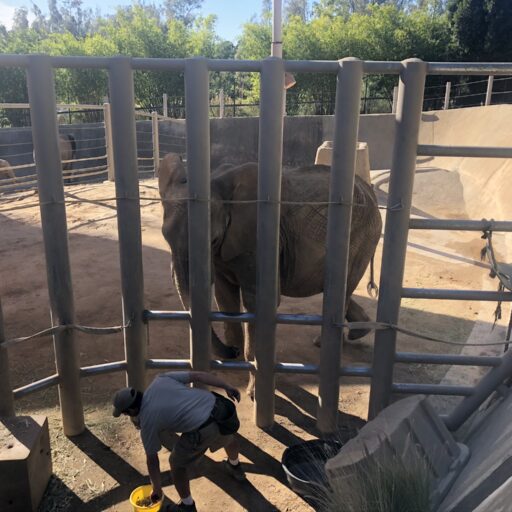
Ndula
San Diego Zoo Safari Park (Escondido, CA)
Ndlulamitsi, also known as “Ndula,” is a wild-born female African elephant who has spent over twenty years confined at the San Diego Zoo Safari Park in Escondido, CA. Born around 1990 in Kruger National Park, South Africa, Ndula was transferred to a preserve in Eswatini in 1994 where she roamed freely with other elephants. In 2003, Ndula and 10 other elephants were captured and imported to the United States to live in captivity in US zoos, despite global public outcry and with zoo and Eswatini officials making misleading claims about the elephants needing to be killed otherwise. The elephants were then split up, and Ndula, who was pregnant at the time, was sent to the San Diego Zoo Safari Park. She gave birth to her son Vusmusi in 2004.
Ndula's Story
Ndlulamitsi, also known as “Ndula,” is a wild-born female African elephant who has spent over twenty years confined at the San Diego Zoo Safari Park in Escondido, CA. Born around 1990 in Kruger National Park, South Africa, Ndula was transferred to a preserve in Eswatini in 1994 where she roamed freely with other elephants.
In 2003, Ndula and 10 other elephants were captured and imported to the United States to live in captivity in US zoos, despite global public outcry and with zoo and Eswatini officials making misleading claims about the elephants needing to be killed otherwise. The elephants were then split up, and Ndula, who was pregnant at the time, was sent to the San Diego Zoo Safari Park. She gave birth to her son Vusmusi in 2004.
Despite what its name implies, the San Diego Zoo Safari Park is not an expansive wildlife park, rather it confines the elephants held captive there to a cramped enclosure. The elephants have access to a mere six acres, which is divided into two yards. At one point, while Ndula was at the zoo, seventeen elephants were forced to share this tiny space. Currently, eight elephants are held captive there.
Since her arrival at the zoo, Ndula has been forced into its captive elephant breeding program. She has given birth to three male calves, all but Vusmusi were sired by Mabu, himself a victim of the same cruel and controversial capture and importation scheme that claimed her freedom. Ndula’s second calf, Lutsandvo, was born in 2010. He was transferred to the Birmingham Zoo in 2019. Her youngest son, Umzula-Zuli, was born in 2018 and remains confined with her.
Despite the zoo’s portrayal of these births as conservation successes, the reality is that Ndula’s offspring have been doomed to a life of confinement and exploitation that will have no benefit for their species. Even if there was any benefit, there’s no justification for the elephants’ suffering.
The story of Ndula and her offspring exemplifies how zoos disrupt elephants’ complex social structures. For example, Ndula’s oldest sons were abruptly separated from her and each other. In the wild, male elephants separate from their familial herds, but they do so gradually, leaving for longer and longer periods of time as they seek to establish their own territory. They also sometimes form “bachelor herds” with other male elephants who’ve separated from their familial herds. The forced separations and transfers of Ndula’s calves at young ages also highlights the unnatural conditions imposed by captivity. In the wild, elephant herds are matriarchal and highly social, with females remaining with their natal groups for life. In addition to being forcibly separated from her offspring when they were very young, Ndula was separated from the female elephants she was imported with, lived with, and bonded with, including Lungile and Litsemba, who were relocated along with Mabu, to the Reid Park Zoo in Tucson, AZ for breeding purposes.
The San Diego Zoo Safari Park continues to use Ndula in its breeding program, perpetuating a cycle of captivity and exploitation. Her offspring will never experience freedom or be a part of the complex natural ecosystem elephants in the wild play an important role in maintaining. Rather, they will remain confined and exploited in US zoos, until and unless they are released to accredited sanctuaries that will allow them to exercise their autonomy and live in a more natural and peaceful environment.
May Ndula and her offspring be the last to endure the hardships of captivity at the San Diego Zoo Safari Park and other zoos. They deserve, and have the right to, live out their lives in environments that respect their intrinsic physical, social, and behavioral needs.
Take action today
A future where no elephant has to endure the traumas of being torn from their families and natural habitats, bred against their will, and shipped from zoo to zoo is possible, and we need your help to make it a reality.
Submit Information
Do you have a tip for us? The Free to be Elephants project relies on our supporters to keep us up-to-date with the latest news, updates and photos about elephants in their local facilities. Use this form to submit your info and help us expose the reality of elephant captivity across America.